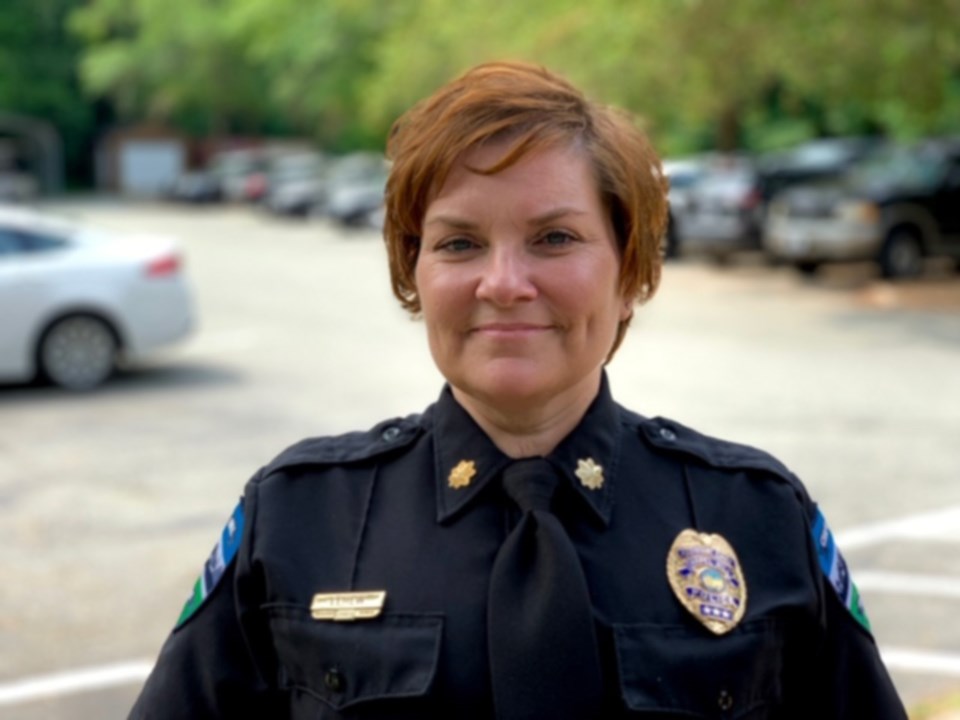You could say Celisa Lehew was born to succeed in a law enforcement career.
“I’ve always been interested in the criminal justice field because both my grandfathers worked at the Burwash Farm (also known as the Burwash Correctional Centre) near Sudbury. So, I grew up with all kinds of stories from them and I just knew that’s what I wanted to do,” Lehew said, speaking to SooToday.
Lehew chased her dream and worked her way up in the police ranks, and in 2017, was chosen to be the first female to serve as a Chapel Hill (North Carolina) Police assistant chief (the equivalent of a deputy chief in Canadian municipal police services).
Chapel Hill, officially categorized as a ‘town,’ has a population of just over 57,000, its motto describing itself as ‘The Southern Part of Heaven.’
“I absolutely love it. I love the field as much today as the very first day I walked through the door...I knew I would have opportunities here (in the U.S.) so this is where I headed,” Lehew said.
Born and raised in Sault Ste. Marie, she attended Grand View Public School and White Pines Collegiate.
Lehew attended Lake Superior State University (LSSU) for four years, earning a bachelor’s degree in criminal justice, then working as a University of Michigan campus police officer in Ann Arbor in the mid-1990s before starting with Chapel Hill Police in 2003.
Lehew now has a master’s degree in justice administration from Methodist University in Fayetteville, North Carolina.
Lehew’s career in policing has run the entire gamut, including patrol, traffic, working with the canine unit, community services and investigations.
While in investigations, she probed many different types of cases, ranging from break and enters to cases of murder.
“I worked on a homicide. It was the Eve Carson case and it received national and international media attention,” Lehew said.
Carson, a University of North Carolina at Chapel Hill student, who was academically gifted, highly involved in student government and community minded, was kidnapped, robbed and shot to death in Chapel Hill March 5, 2008.
Carson was 22 years old.
Two men, Demario James Atwater and Laurence Alvin Lovette Jr., were charged with her murder and found guilty, the two both serving life sentences with no chance of parole.
“I was the lead investigator,” Lehew said.
“We arrested the two suspects a few days after her murder. It was a tragedy and a devastating thing to have to investigate and go through but it really showed how significant a police officer’s role is, what an investigator’s role is.”
Lehew, who added she is currently investigating another homicide from 2012, said much of the crime in Chapel Hill revolves around alcohol, drugs and break and enters.
“I wouldn’t call it a high crime area in Chapel Hill but next door to us is Durham, which has a very high crime rate...there’s a lot of substance abuse there and it’s a lot larger (with a population of 267,000), so Chapel Hill becomes an area of opportunity for some folks.”
Lehew works alongside a second, male assistant chief.
She oversees patrol, investigations and school resource officers, with approximately 130 officers under her command.
“Being in a male-dominated profession most definitely had its challenges, so it was not only a personal accomplishment but it was quite a first for the town,” Lehew said.
“I think it would be fair to say women bring a different dynamic to the police world. It’s been a real blessing and an opportunity for not only myself but also for the town.”
“(Women in policing are different) in the way we communicate. We definitely have a different connection to calls that involve women, and our de-escalation techniques seem to come a little bit differently to females than they do males, so I think that’s a good balance when you have a woman responding to calls and being in command, in an administrative position,” Lehew said.
“We have a different way of communicating. I think women are looked upon as perhaps gentler and just have a different way of de-escalating things. I think, a lot of times, we make a connection very quickly with either a victim or a suspect, and that helps to get to the bottom of things.”
Responding to calls and investigating cases of violence against women is, of course, tough to deal with.
“(But) I’ve always felt very empowered by my peers who surround me when responding to calls and interacting with victims, suspects or witnesses. Of course, it’s infuriating to see a victim in an abusive relationship but I think it (being female) gives me an advantage when it comes to those empathetic feelings,” Lehew said.
Though now in an administrative position, Lehew said she still gets out and about in a police car to keep up good working relationships with officers on patrol and for public speaking engagements.
She also oversees GEMS (Girls Empowered, Motivated and Spectacular), a program which introduces 14 to 21-year-old females to the public safety field and local government, an eight-week program held twice a year.
Lehew also sits on two not-for-profit boards, one of which she described as a dispute settling program, the other an agency which provides programming for children with incarcerated parents.
Lehew, 47, is a married mother of two daughters, her husband also a police officer.
She still visits family members on St. Joseph Island twice a year.
Lehew said she would like to encourage young people, both male and female, who are interested in a law enforcement career, to go for it.
“I think it’s a very rewarding career. When people ask me how do I describe it, I say ‘energizing.’ It’s never the same two days in a row. There’s always something new to look at and learn. And, if your passion is to help people this is a profession that is really rewarding in that way.”
